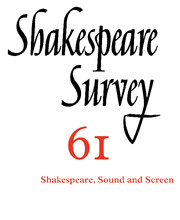Book contents
- Frontmatter
- Sarah Siddons, theatre voices and recorded memory
- Playing with Shakespeare’s play: Branagh’s Love’s Labour’s Lost
- Bottom and the gramophone: Media, class and comedy in Michael Hoffman’s A Midsummer Night's Dream
- Maurice Evans’s Richard II on Stage, Television and (Almost) Film
- Richard II on the Screen
- ‘Where Lies Your Text?’: Twelfth Night in American Sign Language Translation
- ‘This uncivil and unjust extent against thy peace’: Tim supple’s Twelfth Night, or what violence will
- ‘There’s no such thing’: nothing and nakedness in Polanski’s Macbeth
- Ghosts and mirrors: the gaze in film Hamlets
- ‘Ben, it’s a terrible thing to hate your mother’: mind control in Hamlet and The Manchurian Candidate
- Channelling the ghosts: the Wooster Group’s remediation of the 1964 Electronovision Hamlet
- Listening to Prospero’s Books
- Lend Me Your Ears: Sampling BBC Radio Shakespeare
- An Age of Kings and The ‘Normal American’
- Shakespeare and British Television
- A Local Habitation and a Name: Television and Shakespeare
- Paying attention in Shakespeare parody: from Tom Stoppard to YouTube
- Madagascan will: cinematic Shakespeares / transnational exchanges
- Still life? Anthropocentrism and the fly in Titus Andronicus and Volpone
- Riddling q1: Hamlet’s mill and the trickster
- ‘Speak, that I may see thee’: Shakespeare characters and common words
- Who do the people love?
- A Partial Theory of Original Practice
- Shakespeare Performances in England, 2007
- Professional Shakespeare productions in the British Isles, January–December 2006
- The Year's Contributions to Shakespearian Study 1 Critical studies
- 2 Shakespeare in performance
- 3a Editions and textual studies
- 3b Editions and textual studies: The RSC Complete Works
- Index to Volume 61
‘Ben, it’s a terrible thing to hate your mother’: mind control in Hamlet and The Manchurian Candidate
Published online by Cambridge University Press: 28 November 2008
- Frontmatter
- Sarah Siddons, theatre voices and recorded memory
- Playing with Shakespeare’s play: Branagh’s Love’s Labour’s Lost
- Bottom and the gramophone: Media, class and comedy in Michael Hoffman’s A Midsummer Night's Dream
- Maurice Evans’s Richard II on Stage, Television and (Almost) Film
- Richard II on the Screen
- ‘Where Lies Your Text?’: Twelfth Night in American Sign Language Translation
- ‘This uncivil and unjust extent against thy peace’: Tim supple’s Twelfth Night, or what violence will
- ‘There’s no such thing’: nothing and nakedness in Polanski’s Macbeth
- Ghosts and mirrors: the gaze in film Hamlets
- ‘Ben, it’s a terrible thing to hate your mother’: mind control in Hamlet and The Manchurian Candidate
- Channelling the ghosts: the Wooster Group’s remediation of the 1964 Electronovision Hamlet
- Listening to Prospero’s Books
- Lend Me Your Ears: Sampling BBC Radio Shakespeare
- An Age of Kings and The ‘Normal American’
- Shakespeare and British Television
- A Local Habitation and a Name: Television and Shakespeare
- Paying attention in Shakespeare parody: from Tom Stoppard to YouTube
- Madagascan will: cinematic Shakespeares / transnational exchanges
- Still life? Anthropocentrism and the fly in Titus Andronicus and Volpone
- Riddling q1: Hamlet’s mill and the trickster
- ‘Speak, that I may see thee’: Shakespeare characters and common words
- Who do the people love?
- A Partial Theory of Original Practice
- Shakespeare Performances in England, 2007
- Professional Shakespeare productions in the British Isles, January–December 2006
- The Year's Contributions to Shakespearian Study 1 Critical studies
- 2 Shakespeare in performance
- 3a Editions and textual studies
- 3b Editions and textual studies: The RSC Complete Works
- Index to Volume 61
Summary
In September 1950, a journalist for the Miami News ran a story that staggered the American imagination and intensified the anti-Communist feelings that were fostering the Cold War. Edward Hunter, who was also a CIA agent, warned Americans that post-revolutionary China was using insidious and heretofore unknown psychological techniques to force the Chinese into the Communist Party. He labelled these techniques with the term ‘brainwashing’, a derisive translation of the Chinese his-nao, which literally means ‘to cleanse the mind’. Hunter’s theories not only reached a receptive audience, but were also quickly verified by other experts, who described similar techniques in Nazi Germany and the Soviet Union . Americans were alerted to the possibility that the Communists had ‘cracked the brain’s code’ and were capable not only of controlling but of changing the will of their fellow citizens. Psychologist Joost Meerloo, a Dutch émigré from Nazi-occupied Holland, warned in his 1956 book Rape of the Mind that brainwashing techniques, which he dubbed with the far more sinister appellation menticide, were being used on an unsuspecting American public:
It is now technically possible to bring the human mind into a condition of enslavement and submission ... the totalitarians [Meerloo’s euphemism for any Communist government] ... influence the mind so slowly and indirectly that we may not even realize what they have done to us.
The reaction of Americans was rather spectacular. Quite rapidly, a panic over the threat of brainwashing spread throughout the country. Americans had already been conditioned to fear nuclear war, but the imagined loss of cherished American autonomy and free will was even more terrifying. Brainwashing embodied cultural fears of losing control and Meerloo’s paradigm for menticide became America’s paradigm for anxiety.
- Type
- Chapter
- Information
- Shakespeare Survey , pp. 134 - 146Publisher: Cambridge University PressPrint publication year: 2008

